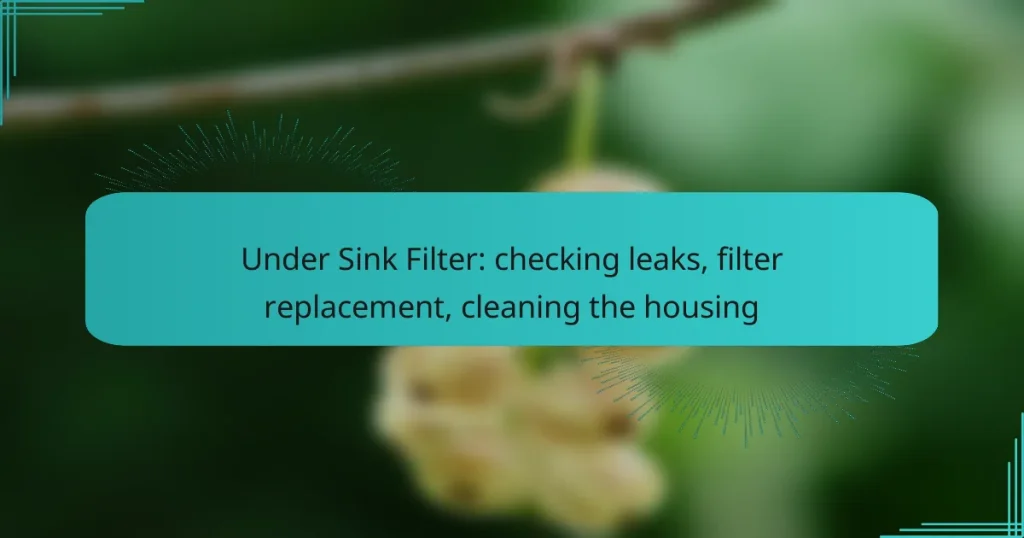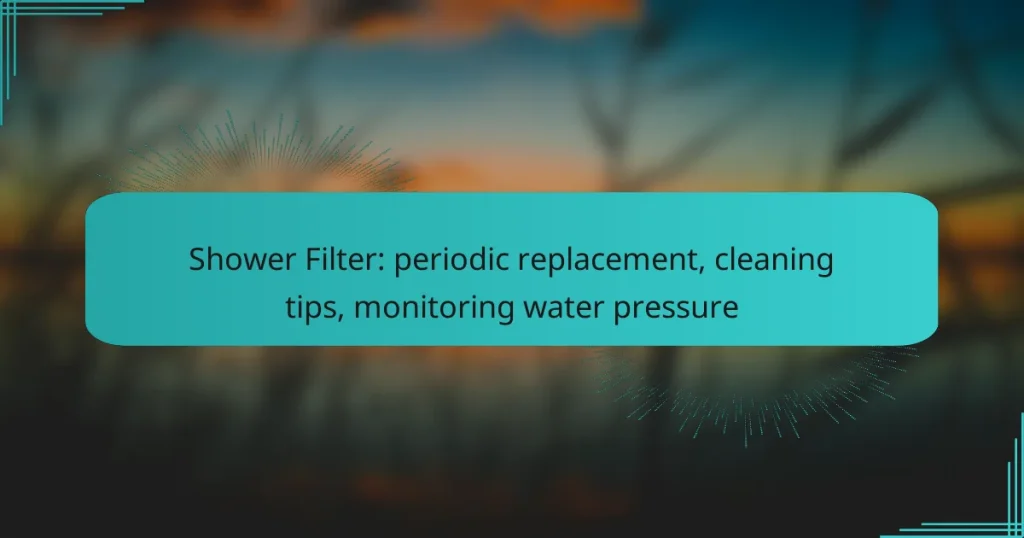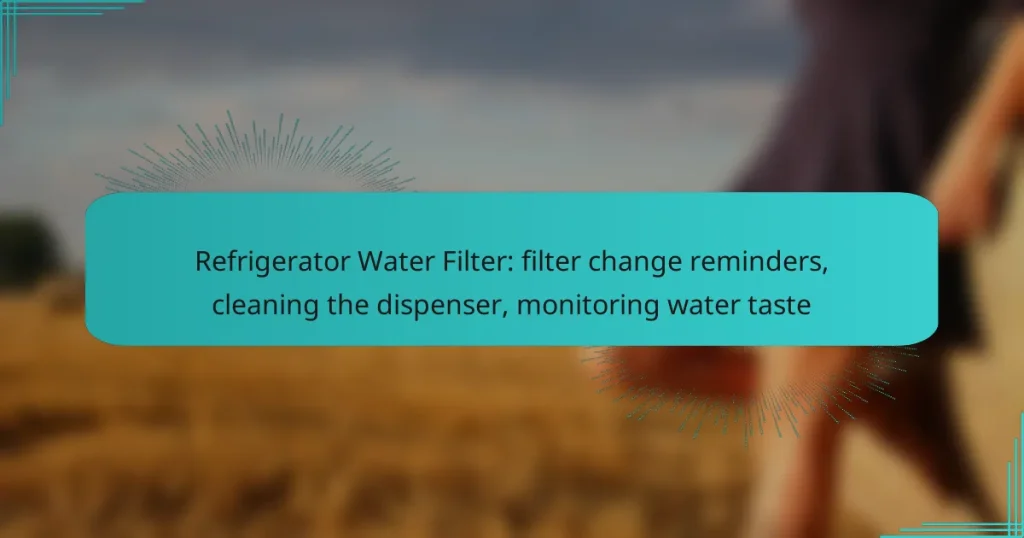Proper maintenance and care of water filtration systems are essential for ensuring optimal performance and high water quality. Regular practices such as timely filter replacements, thorough cleaning, and consistent monitoring can prevent common issues like clogs and leaks. By promptly addressing symptoms like unusual tastes or odors, you can troubleshoot problems effectively and keep your system running smoothly.
Activated Carbon Filter: replacement schedule, cleaning tips, storage conditions
Shower Filter: periodic replacement, cleaning tips, monitoring water pressure
Refrigerator Water Filter: filter change reminders, cleaning the dispenser, monitoring water taste
How to maintain water filtration systems in London?
Maintaining water filtration systems in London involves regular upkeep to ensure optimal performance and water quality. Key practices include timely filter replacements, thorough cleaning procedures, and consistent monitoring of water quality.
Regular filter replacement
Regular filter replacement is crucial for the efficiency of water filtration systems. In London, it is generally recommended to change filters every 6 to 12 months, depending on usage and water quality. Check the manufacturer’s guidelines for specific recommendations.
To avoid reduced flow rates and contaminants in your drinking water, keep a schedule for filter changes. Consider using a calendar reminder or a tracking app to stay on top of this maintenance task.
System cleaning procedures
Cleaning your water filtration system is essential for preventing buildup and ensuring longevity. Most systems require a thorough cleaning every 3 to 6 months, which may involve rinsing components and sanitizing tanks. Always refer to the user manual for specific cleaning instructions.
Use a mixture of water and vinegar or a mild detergent for cleaning. Avoid harsh chemicals that could damage the system or leave harmful residues. After cleaning, run the system for a few minutes to flush out any remaining cleaning solution.
Monitoring water quality
Monitoring water quality is vital to ensure the filtration system is functioning properly. In London, you can use water testing kits to check for contaminants such as chlorine, lead, and bacteria. Regular testing helps identify any issues early on.
Consider testing your water quality every few months or after any significant changes in taste or odor. If you notice any irregularities, consult a professional to assess your filtration system and make necessary adjustments.
What are common issues with water filtration systems?
Common issues with water filtration systems include clogged filters and leakages in the system. Addressing these problems promptly can ensure the system operates efficiently and maintains water quality.
Clogged filters
Clogged filters are a frequent issue that can reduce water flow and filtration efficiency. This often occurs due to the accumulation of sediment, minerals, or organic matter in the filter media.
To prevent clogging, regularly check and replace filters according to the manufacturer’s recommendations, which is typically every 6 to 12 months. If you notice a significant drop in water pressure, it may indicate that the filter needs immediate attention.
Leakages in the system
Leakages in water filtration systems can lead to water wastage and potential damage to surrounding areas. Common causes include worn-out seals, loose connections, or cracks in the housing.
To address leaks, inspect the system regularly for any signs of moisture or water pooling. Tightening connections and replacing faulty seals can often resolve minor leaks, while more significant issues may require professional assistance to ensure proper repair.
How to troubleshoot water filtration problems?
Troubleshooting water filtration problems involves identifying symptoms such as unusual tastes, odors, or pressure drops. Addressing these issues promptly can help maintain water quality and ensure the system operates efficiently.
Identifying unusual tastes or odors
If your water has a strange taste or smell, it may indicate a problem with the filtration system. Common issues include the presence of chlorine, sediment, or even bacterial growth, which can affect the water’s quality.
To troubleshoot, first, check the filter’s condition. If it is clogged or past its replacement date, replacing it can often resolve the issue. Additionally, consider the source of your water; municipal supplies may have varying levels of chlorine or contaminants.
Checking for pressure drops
A noticeable drop in water pressure can signal a malfunction in your filtration system. This may be caused by a clogged filter, a leak in the system, or even issues with the water supply itself.
To check for pressure drops, monitor the flow rate of water from the faucet before and after the filtration system. If you notice a significant difference, inspect the filter and any connections for blockages or leaks. Regular maintenance, including timely filter replacements, can help prevent pressure issues.
What are the costs associated with water filtration maintenance?
The costs associated with water filtration maintenance can vary significantly based on the type of system and its specific requirements. Key expenses typically include filter replacement costs and service call fees, which are essential for ensuring optimal performance and water quality.
Filter replacement costs
Filter replacement costs depend on the type of filtration system you have. For example, basic carbon filters may range from $10 to $50, while reverse osmosis filters can cost between $30 and $100 each. It’s important to check the manufacturer’s recommendations for replacement frequency, which often ranges from every six months to two years.
To manage filter replacement expenses, consider purchasing filters in bulk or subscribing to a filter delivery service. This can often reduce costs and ensure you have replacements on hand when needed.
Service call fees
Service call fees for water filtration systems can vary based on location and the complexity of the issue. Typical fees range from $50 to $150 per visit, depending on the technician’s expertise and the nature of the service required. Some companies may offer maintenance packages that include regular check-ups at a reduced rate.
When scheduling service calls, it’s wise to ask about potential additional charges for parts or repairs. Keeping a maintenance log can help you track service history and anticipate future needs, potentially saving you money in the long run.
What are the best practices for water filtration care?
The best practices for water filtration care include regular inspections and using quality replacement parts. These steps ensure the system operates efficiently and maintains the quality of the filtered water.
Regular system inspections
Conducting regular inspections of your water filtration system is crucial for identifying potential issues before they escalate. Aim to check the system at least once every six months, looking for signs of wear, leaks, or blockages.
During inspections, pay attention to the filters, hoses, and connections. If you notice any discoloration or unusual odors, it may indicate that the filters need replacement or that the system requires servicing.
Using quality replacement parts
Using quality replacement parts is essential for the longevity and performance of your water filtration system. Always opt for parts that meet the manufacturer’s specifications to ensure compatibility and effectiveness.
Consider purchasing filters and components from reputable brands or authorized dealers. While cheaper alternatives may seem appealing, they can compromise water quality and system efficiency, leading to higher long-term costs.
How to choose a water filtration service in the UK?
Choosing a water filtration service in the UK requires careful consideration of several factors, including service reputation, package offerings, and customer support. Prioritize companies that are transparent about their processes and have a proven track record of reliability.
Evaluating service reviews
Start by checking online reviews from customers who have used the water filtration service. Look for platforms like Trustpilot or Google Reviews, where you can find detailed feedback on service quality and customer satisfaction.
Pay attention to both positive and negative reviews. A company with a high number of positive reviews and a low number of complaints is generally a good sign. Look for patterns in the feedback, such as consistent praise for timely service or complaints about hidden fees.
Comparing service packages
When comparing service packages, consider what each package includes, such as installation, maintenance, and filter replacements. Some companies may offer comprehensive packages that cover all aspects of water filtration, while others may charge separately for each service.
Check if there are any long-term contracts or cancellation fees associated with the packages. It’s often beneficial to choose a flexible plan that allows you to adjust services as needed without incurring extra costs.



